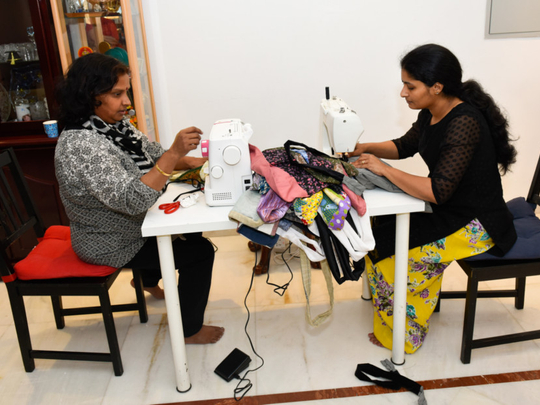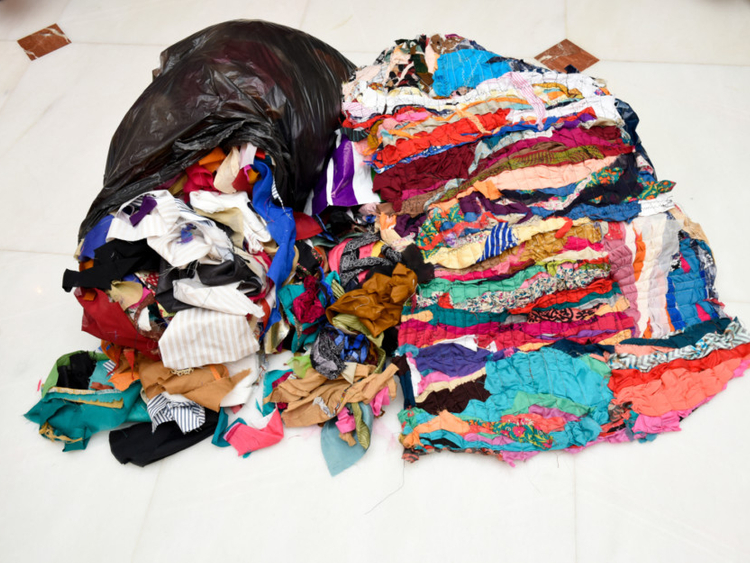
Dubai: When we hand in a piece of cloth to a tailor for stitching, we often don’t pay attention to the material that is wasted. This is where the ‘Save, Scrap, Sew’ (SSS) comes in.
Every week, a group of women meet up for three to four hours in Dubai’s Al Qusais, Karama or Bur Dubai areas for a charitable initiative. The idea is simple — use scrap material, which would otherwise be thrown, to create bags, pillows or bedsheets for the less fortunate.
Shambavi Rajagopal, a university professor based in Dubai, is the one who initiated the project.
She said: “If we were living in an underdeveloped country, the tailors may have used the leftover fabric to make something for their own family. Even in highly industrialised places, the material would be used to clean machinery. Here, tailors just throw them into the garbage and it ends up in a landfill. Our vision is to keep things simple. We work small, with the idea of achieving big results.”
Members of the group are told to ask their tailors for any leftover material.
Rajagopal said: “Sometimes the tailors ask what we plan to do with the scrap material. We show them photos from our Facebook page. It started off with me picking up scraps from my tailor to make something for myself. But, the material would just sit in a corner. I have friends who say they have bedsheets they haven’t used in ten years. So, if it is going to waste or is something you haven’t used, let’s use our energy to make something good out of it.”
The project, which was initiated seven months ago, has drawn a lot of attention amongst stay-at-home mums.
Rajagopal said: “A lot of people experience empty nest syndrome. Their children have gone away, and they may be feeling helpless, as they have dedicated 18 years of their life to their children. For them, this initiative is a relief, as they feel needed and have something to do. The products are given off to people in need. If somebody knows someone, like a family living here, who is in need, we give the products to them. We are not working or associated with a specific charity. As and when the need arises, we give things away.”
Prema Venkatasubramanian, one of the first members of the group, was interested in contributing as soon as she heard about the initiative.
She said: “We all want to do something for the society. Through such initiatives, we are conveying the message of saving, sharing and caring for others. Our job begins with us sorting, measuring, cutting, ironing and stitching the material. Once the product is ready, it is distributed to the needy in the UAE, India or elsewhere.”
When she first found out about SSS, Venkatasubramanian says she asked Rajagopal a lot of questions.
She said: “I asked her about the idea of SSS and how she came up with it. One day, she saw her tailor carrying big bags of scrap material to be thrown into the garbage bin. Ultimately, these would find their way to a landfill. So, she wondered if something useful could be done with it. Motivated by the fact that the finished products would find deserving end users, she launched SSS.
“Initially she raised awareness through word of mouth or by spreading the word through Whatsapp. At present, we have 35 to 40 volunteers working on this project. A Facebook page and website have been set up for sharing pictures of completed bags and bedsheets with our friends. I would request women who feel lonely to just get a sewing machine, if they don’t already have one, a bag of scrap material from your tailor and a group of enthusiasts to work. You are going to do wonders and bring big smiles when the end results are marvellous.”
Most of the members say that when introduced to the project, they didn’t realise how gratifying it would be to work in collaboration with others. They look forward to meeting their group mates and feeling the excitement at seeing the final products, especially the smiles on the faces of people when the products are distributed.
Vijaya Sukumar, a resident of the Karama area in Dubai, said: “This concept is a complete win-win venture. It brings together women from different walks of life, allowing them to use their time and creativity in a satisfying manner.”
Roopa Shankar, a homemaker based in the Al Qusais area, said: “It is a drop in the ocean, as we do take some time to convert a bag of waste into useful articles. But, we hope that our group grows and we are able to save every bag of scrap.”
Shoba Murthy, a resident of Dubai, said: “I joined in February. I was working earlier, but after quitting my job, I was looking for something worthwhile to do wherein I could contribute to society. Thanks to this initiative, I now feel like I’m doing something good. It may be in a small way, but it’s still something.”
Raji Nair, a Dubai resident, has been a member of the group for the past six months.
She said: “When I came across this group, I thought I just had to join it, because it was for a good cause and for charity. I never knew that by using scrap, we are able to create such beautiful bags and other products. I hope to continue this journey.”
Annada Dubey, a Dubai-based homemaker, said: “I joined about two months ago and initially, I didn’t have a sewing machine, so I would just cut material. But, when I saw other people stitching, I thought I too, have to be creative and so, bought a sewing machine and started making bags. It felt really nice because it is for charity, after all. The group is great because when we meet we laugh and socialise. So, it’s given us a direction in life.”
Nisha Varghese, resident of Dubai, said: “SSS brings us closer to Mother Earth, where her children try to wipe the burden of junk off her face.”
For more details regarding the project, visit www.savescrapnsew.com or their Facebook page, “Save Scrap & Sew”.
— Be a community reporter. Tell us what is happening in your community. Send us your videos and pictures at readers@gulfnews.com
Facts:
According to the US Environmental Protection Agency, the US alone generates around 11.3 billion kilograms of textiles per year, which include clothing, footwear, linens and other textiles. Of this, at least 85 per cent ends up in their landfills. This textile waste occupies nearly five per cent of all landfill space in the country. In the UK, an estimated 350,000 tonnes of used clothing goes to landfill every year, according to UK-based Waste and Resources Action Programme.
Decomposing clothing releases methane, a harmful greenhouse gas and a significant contributor to global warming. There are dyes and chemicals in fabric and other components of clothing and shoes that can leach into the soil, contaminating both surface and groundwater.
Almost 50 per cent of the textiles that are destined for the trash could actually be recycled, which means we, as consumers, simply need to get better about recycling our clothing and textiles.









